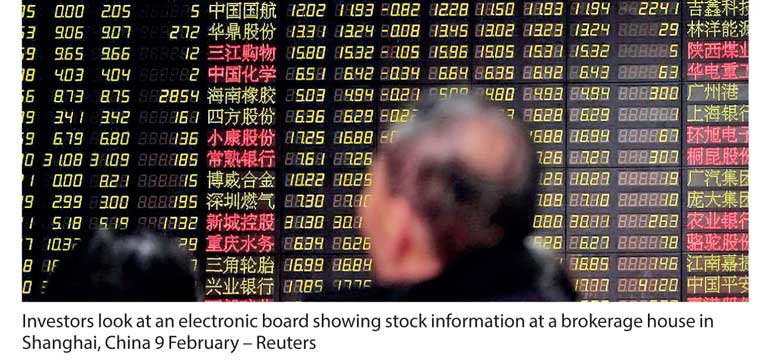Tuesday Feb 24, 2026
Tuesday Feb 24, 2026
Friday, 2 March 2018 00:00 - - {{hitsCtrl.values.hits}}
 TOKYO (Reuters): Asian stocks were mostly lower on Thursday after Wall Street marked its worst monthly performance in two years as hawkish-sounding comments from new Federal Reserve Chair Jerome Powell reverberated across the broader risk asset markets.
TOKYO (Reuters): Asian stocks were mostly lower on Thursday after Wall Street marked its worst monthly performance in two years as hawkish-sounding comments from new Federal Reserve Chair Jerome Powell reverberated across the broader risk asset markets.
Spreadbetters expected European stocks to open lower, with Britain’s FTSE falling 0.7%, Germany’s DAX slipping 0.8% and France’s CAC retreating 0.75%.
Investors have been on edge in recent weeks amid concerns that rising interest rates in advanced economies, led by the United States, could sap global growth.
Powell, in his first public appearance as head of the Fed, vowed at a congressional hearing on Tuesday (U.S. time) to prevent the economy from overheating while sticking with a plan to gradually raise interest rates.
Those comments rekindled speculation in equity markets over U.S. monetary tightening this year happening faster than expected, feeding concerns that higher borrowing costs could crimp corporate activity and cool economic growth.
MSCI’s broadest index of Asia-Pacific shares outside Japan was down 0.5% and headed for its third day of losses.
Chinese shares bucked the trend and edged up after a private survey showed growth in China’s manufacturing sector picking up to a six-month high. Shanghai shares were 0.15% higher.
Australian stocks fell 0.7%, South Korea’s KOSPI shed 1.2% and Japan’s Nikkei dropped 1.55%.
The losses in Asia came amid a broad selloff on Wall Street, where the Dow and S&P 500 capped their worst months since January 2016 overnight after suffering sharp losses early in February.
The Dow scaled an all-time high late in January, before falling about 12% from that peak at the start of February as a rise in U.S. yields to multi-year highs unnerved Wall Street. It went on to recover a bulk of those losses, but the rebound stalled in the wake of Powell’s comments.
The Fed’s last round of economic projections in December pointed to three rate increases this year, but Powell’s remarks prompted investors to wager on four rate rises instead.
“The markets will try to further price in prospects of accelerated Fed tightening if the U.S. employment report on March 9 and inflation data on March 12 point to growth in wages and a rise in prices,” said Masahiro Ichikawa, senior strategist at Sumitomo Mitsui Asset Management in Tokyo.
“In such a case we could see another round of rising long-term Treasury yields, dollar appreciation and decline in U.S. equities.”
The dollar, which retreated to three-year lows last month, has taken heart from the Fed chair’s comments. The dollar index against a basket of six major currencies rose to 90.744, its highest since Jan. 19 and last stood at 90.703.
The index has managed to claw back from the three-year trough of 88.253 set in mid-February when fears of a ballooning U.S. budget deficit and lingering worries that Washington could pursue a weak dollar policy took a toll.
“The comeback by the dollar could negatively impact crude oil prices and in turn cool inflation expectations. In that case, the equity markets could be forced to undergo significant adjustments,” said Makoto Noji, senior strategist at SMBC Nikko Securities in Tokyo.
U.S. crude oil futures stood little changed at $61.65 per barrel after sliding more than 2% overnight. Brent crude lost 0.1% to $64.66 per barrel.
A stronger greenback tends to weigh on commodities including crude as it makes them more expensive for non-U.S. buyers of dollar-denominated products.
The euro was steady at $1.2192 and in close reach of a 1-1/2-month low of $1.2188 plumbed the previous day. The common currency came under pressure after data on Wednesday showed euro zone inflation slowing to a 14-month low and underscored the European Central Bank’s caution over removing its monetary stimulus.
The dollar was little changed at 106.750 yen, having slipped from the week’s peak of 107.680 as broader risk aversion favoured its Japanese peer.
The Australian dollar was down 0.45% at $0.7728 after brushing $0.7717, its lowest since late December.
Long-term U.S. Treasury yields stood little changed at 2.864% after declining about 3 basis points overnight on month-end purchases by investors rebalancing their portfolios and weaker Wall Street shares.